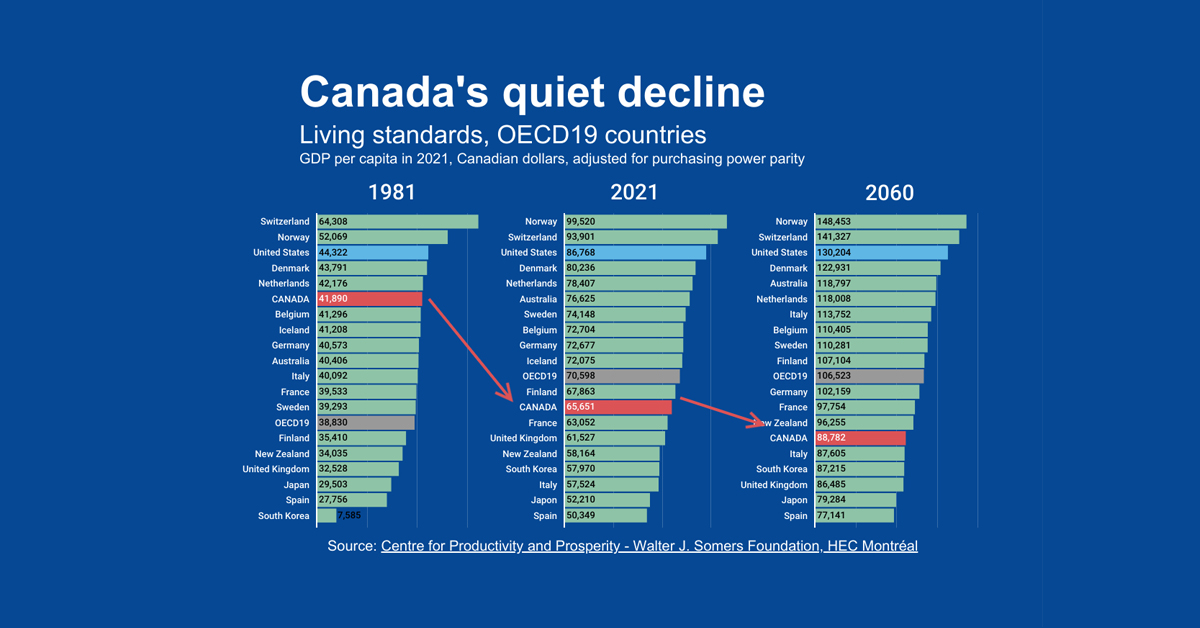The low productivity of Canadian businesses threatens our living standard. Canada needs to foster internal competition.

policyoptions.irpp.org
I agree with the above piece; though I find the lack of specificity a problem.
On competition: Let's break up the 3 or 4 largest sectoral oligopolies
The grocery sector, split up Empire and Loblaws; and order as well that you can't be in the grocery wholesale business and the retail business.
Relatedly, ban listing fees at all retailers without exception. Listings fees create a brutal barrier to entry and reduce competition. I'm friends with the boss of a small gourmet food producer and can say, a few years ago when they wanted on to the national grocery shelves, the base entry fee to get on just one national supermarket chain's buy list (this is not the same as getting an order, but just being eligible to be ordered from) was $40,000. There was then a per sku, per store listing fee on top of that.
The Telcos are another obvious set that come to mind, hiving off 1/3 of customers from the market leaders might be something useful; but I would interested in a couple of different ideas, really easing up on re-sellers and creating a proper, regulated wholesale market for spectrum and fibre space; I'd also like to force Rogers and Bell completely out of the content business (TV Stations, production) as this is a huge conflict of interest and results in weird subsides crossing different units.
The Big Banks are a curious case, as they are generally competitive overseas; but they also milk the domestic market heavily. I think a focus there should be on ripping away some of their retail heft and maybe aiming for a 'Big 7' instead of Big 5' could be helpful; but we may also just need some regulation in the market in respect of reducing bank fees; and also mandating more access to capital for both first time business owners but also venture capital. To be clear, the last thing we need is the gov't micro-managing, any mandate should be at the high level, not loan by loan, sector by sector or region by region.
****
I think we need to look at finishing the unification of capital markets and incorporation rules in Canada. We made a dent a few years ago; but we need a simple idea, if you're incorporated in any province, you're incorporated in every province, under the same basic rules.
We also need to streamline/unify several other key sets of regulations (franchising comes to mind)
Provinces should free to set their own labour regulations in some measure; but I think providing a roughly common floor would be helpful and a good way to sell the overall package to the masses.
Harmonize the minimum number paid personal/sick days, the minimum amount of paid vacation, a common set of 10 Statutory Holidays , and the length of the work week, and you simplify doing business. If you 'raise' those standards
to the highest in any province currently (ie. most vacation days) you also raise the standard of living for most people.
- 5 paid personal days for everyone (BC), 3 weeks paid vacation from year 1 (Sask), 10 Stat. Holidays (BC is actually currently at 11, but there's a wide number and bringing everyone to a common 10 +1 of their choosing would minimize hassle while providing a perk.
- The work week should be 40 hours, that's the rule in the U.S., and in Canada it ranges (44 in Ontario) (48 in Nfld)
****
This one will sound strange to some, I'd raise corporate taxes; the reason I would do this is to lower fixed costs (imposed by gov't) that act as barriers to entry.
So, in Ontario, I would raise corporate tax, but then use that money to:
- Allow Ontario to create a true wholesale market for beer/wine/spirits for the hospitality sector.
- Allow a reduction in Business Education Taxes which are fixed tax one pays whether profitable or not
- Eliminate needless regulatory bodies and their associated fees (many are needed, but many are useless)
- Use the money to pay down Hydro-related debt so that we don't require the large power subsidies but can maintain competitive rates.
****
Time to eliminate the Dairy Cartel. I favoured supply management for many years, as it avoided the need for some of the dairy subsidies we see in the U.S. But both excessive pricing and competition stifling demand a new path.
****
Raise the cost of labour. Time to lift the minimum wage to at least $20 per hour everywhere in Canada; and to at least $23 per hour in the two most expensive places to live, the lower mainland in BC and the Greater Golden Horseshoe.
This will drive investment in automation and labour-saving tech.
As will cutting off the supply of TFWs and exploited foreign students filling fast food and security jobs and the like.
To be clear, I would in no way limit educated, high-end labour coming in; nor would I reduce by even one top tier university students both graduate and under-grad coming in; I would focus on those we exploitively mooch in the
Community College system and who are clearly not benefiting, from the status quo and neither is Canada.
****
Eliminate small business tax rates, these actually create a dis-incentive to growth. Re-focus on less needless regulation, lower/no fees, reduced fixed-cost taxes, across the board.
Edit to add: We've all talked ad nauseum (and rightly so) about the hyper-inflated real estate ponzi scheme, its worth noting its effect on starting and growing new business as well.

 www.bbc.com
www.bbc.com






